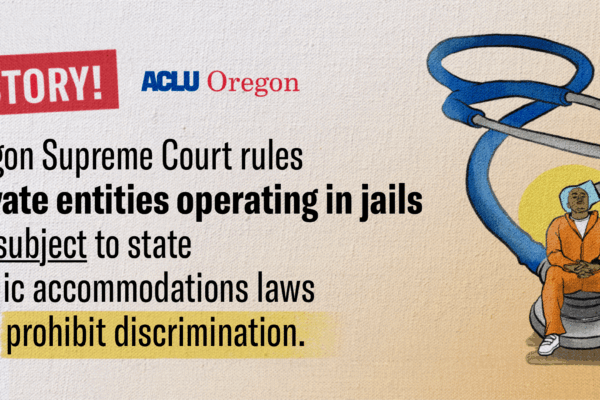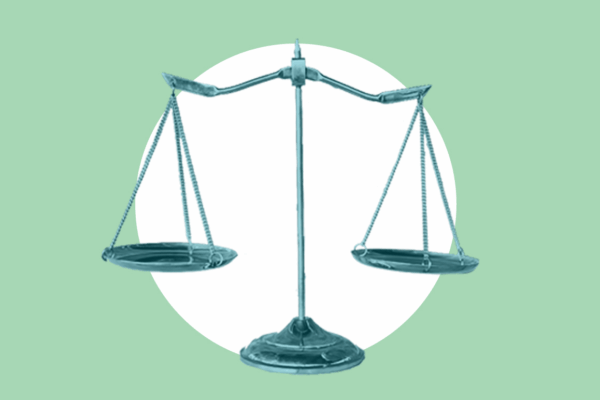In a huge win for disability rights in Oregon jails, the Oregon Supreme Court ruled last Friday that private entities, such as Corizon Health, are subject to state public accommodations laws which prohibit discrimination based on a number of protected class statuses. The Ninth Circuit had asked the Oregon Supreme Court to opine on the subject in order to help the federal court resolve a class action lawsuit. The original suit seeks relief for people who use American Sign Language and experienced discrimination in the Clackamas County Jail’s health services when Corizon employees failed to use an ASL interpreter resulting in harmful healthcare decisions for their ASL patients.
In May 2021, Disability Rights Oregon, Lewis & Clark Law School’s Criminal Justice Reform Clinic, and the ACLU of Oregon, represented by the MacArthur Justice Center, filed a friend-of-the-court brief to the Oregon Supreme Court highlighting the often deadly harms of the for-profit medical care industry operating in jails and prisons. The harms are especially severe for people with disabilities. The brief argued that the Oregon Supreme Court should find that private medical care contractors operating in Oregon jails must comply with Oregon’s law prohibiting disability discrimination in places of public accommodation and should be held liable when they fail to accommodate people with disabilities.
Read the full opinion here: https://www.aclu-or.org/app/uploads/drupal/sites/default/files/opinion.pdf
Read the friend of the court brief here: https://www.aclu-or.org/app/uploads/drupal/sites/default/files/field_documents/abraham_v._corizon_amicus_curiae.pdf
Emily Cooper, Legal Director of Disability Rights Oregon:
"People with disabilities should have the same access to medical care as everyone else, as Congress recognized when it passed the Americans with Disabilities Act. While people in jails don't get to choose who their healthcare provider is, this does not exempt those providers from their duty to provide people with disabilities with the accommodations that meet their healthcare needs. This decision will save lives and is a victory for people with disabilities, people who are incarcerated, and the principle of equal treatment under the law."
Aliza Kaplan, Professor, Lewis & Clark Law School:
“People who are incarcerated, like all Oregonians, deserve the right to be treated equally and fairly when receiving healthcare. This ruling is a critical step towards holding private health care companies accountable. I applaud the Oregon Supreme Court for recognizing that these companies are not above the law.”
Daniel Greenfield, Supreme Court and Appellate Counsel of MacArthur Justice Center:
“Prison and jail healthcare is big business, earning the five largest players more than $4 billion annually. Touted by private equity and hedge fund managers as a market-based improvement to publicly provided correctional healthcare, the reality does not match the hype. While costs have soared, health outcomes have plummeted, leaving a trail of death and destruction behind. This decision will help protect the most vulnerable Oregonians from companies that consistently prioritize profit over quality health care.”
Kelly Simon, Legal Director of ACLU of Oregon:
“The law should not protect profits over people’s lives. As we have seen time and again, correctional health care in Oregon consistently falls below the constitutional floor. The lack of transparency and accountability for private contractors responsible for these services in our county jails must change. We are pleased with the Oregon Supreme Court’s rational application of the few laws we do have to address the serious harms this industry causes to Oregonians.”
About Disability Rights Oregon:
Disability Rights Oregon is a non-profit advocacy organization. Our work is guided by the annual priorities set out by a Board of Directors, a Mental Health Advisory Council, and the disability community. Since 1977, we've gone into places that others can’t. We shine a light on conditions in jails, prisons, hospitals, schools, and other facilities across the state. We fight to uphold the civil rights of Oregonians with disabilities regardless of where they live.
About Lewis & Clark Law School Criminal Justice Reform Clinic:
Under the supervision of Professor Aliza Kaplan, the Criminal Justice Reform Clinic offers an exciting opportunity for students to get hands-on legal experience while engaging in a critical examination of and participation in important issues in Oregon’s criminal justice system.
About MacArthur Justice Center:
The Roderick & Solange MacArthur Justice Center (MJC) is a not-for-profit organization founded by the family of J. Roderick MacArthur to advocate for civil rights and a fair and humane criminal justice system. MJC has represented clients facing a myriad of civil rights injustices and frequently litigates on behalf of incarcerated people, including those subjected to discrimination on the basis of disability.
About ACLU Oregon:
The ACLU of Oregon is an affiliate of the national ACLU which has affiliates in 50 states, Washington, D.C. and Puerto Rico. The ACLU of Oregon is a nonpartisan, nonprofit membership organization with more than 28,000 members statewide. The organization works in the courts, in the state legislature and local governments, and in communities to defend and advance our civil liberties and civil rights under the U.S. and Oregon constitutions and the laws of the United States and Oregon.
* * *
End
Stay Informed
Sign up to be the first to hear about how to take action.
By completing this form, I agree to receive occasional emails per the terms of the ACLU’s privacy statement.
By completing this form, I agree to receive occasional emails per the terms of the ACLU’s privacy statement.


